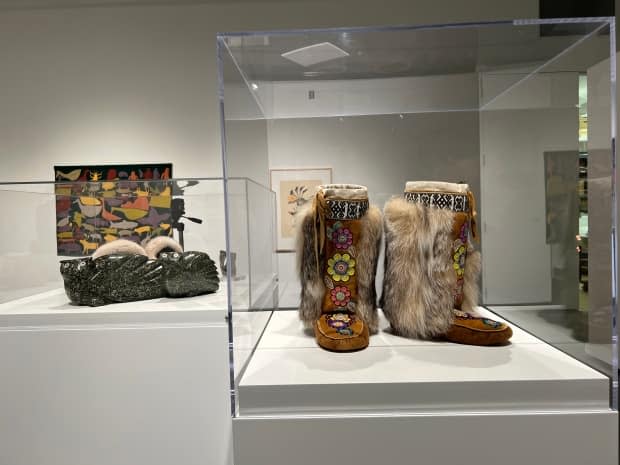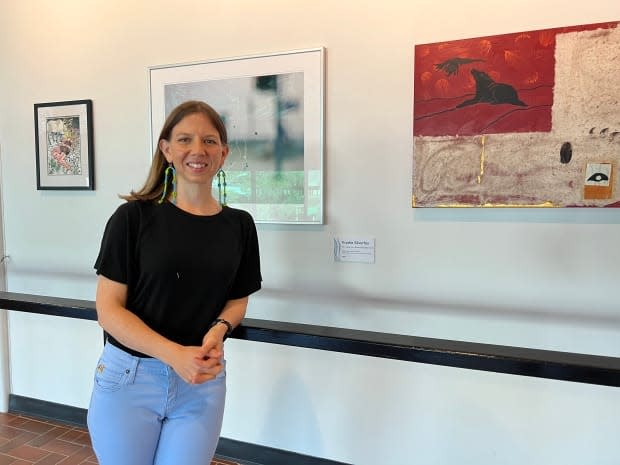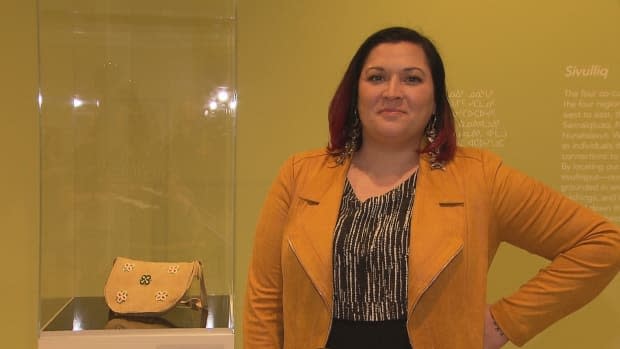Arctic Arts Summit in Yukon to showcase Indigenous talent

They were still busy at the Yukon Arts Centre in Whitehorse on Friday, putting together a new exhibition to coincide with next week's Arctic Arts Summit.
The curators of "Tether" — a central showcase of visual art at the three-day summit which begins Monday — were excited by the pieces they'd selected from collections across the country, now all together in one room.
"A lot of these collections are often hidden away in storage, so it's always wonderful to reactivate their energy in a new space," said Heather Von Steinhagen, one of the four exhibition curators, all of whom are Indigenous.
The 50-plus works that make up "Tether" are also all from northern Indigenous creators.
"When the work showed up, it was just amazing," said fellow curator Teresa Vander Meer-Chassé.
"Having the opportunity to display this work here, for the Yukon, for the Arctic Arts Summit delegates, for them to see how talented northern artists really are … We're just really proud of displaying this work."
The Arctic Arts Summit will bring together creators, arts organizations, journalists and policy-makers from across the circumpolar North next week to rub shoulders, bend ears, or pick brains. There will be seminars, panel discussions, performance pieces, films, music and an art crawl. There may be wine and cheese.

Sophie Tremblay-Morissette, manager of arts with the Yukon government and a lead organizer of the summit, says the goal is "to create opportunities for circumpolar cooperation and collaboration."
"We want to bring people together so they can exchange, share, experience — and hopefully a lot of good things can come out of it," she said.
This will be the third-ever Arctic Arts Summit. The first was held in Norway in 2017, and the second two years later in Finland. Whitehorse was selected to host the 2021 event, with the territorial government and the Canada Council of Arts as official hosts. It was postponed to this year because of COVID-19.
More than 300 delegates are expected, from across Canada, the U.S., Sweden, Norway, Denmark, Finland and Iceland. It will be one of the biggest international gatherings in the North since before the pandemic.
The earlier summits also included a Russian delegation, but they were not invited this time.
Many of the delegates will be government representatives, including the Nordic Council of Ministers, and the Sámi Parliament which represents the Indigenous people of Scandinavia.
"People who can make decisions and change based on what they hear," Tremblay-Morissette said.
But the greater focus this time, she says, will be on artists and creators.

"I have to say that we've made the very conscious decision this time around to really focus on artists' voices. Like, they will take the centre stage. Indigenous voices in particular," Tremblay-Morissette said.
That's partly reflected in the theme of this summit, which is about connections to the land, said coordinating producer Heather Igloliorte.
"We're looking at that through a number of different lenses and ways that you can approach that theme," Igloliorte said.
"That includes, of course, land, which is language and community, heritage and identity, Indigenous sovereignty, which includes both identification and self-determination. Climate, of course, so environmental sustainability but also access to the land."
It's a big theme, she admits.
"We're really excited to see it come together. There's going to be so many different activities and programming and conversations happening."

The summit will overlap and interact with another big showcase of Indigenous arts and culture in Yukon — the annual Adäka Cultural Festival, which officially begins in Whitehorse on Wednesday, the last day of the Arctic Arts Summit. The Adäka festival is another event that was effectively put on hold for the last couple of pandemic years, but returns this year to mark its 10th anniversary.
"So we're really, really excited about this year. We're also excited to welcome the world," said Charlene Alexander, executive director of the Yukon First Nations Culture and Tourism Association and co-founder of Adäka.
She's especially enthused about a performance piece that will be staged at the Yukon Arts Centre, ahead of Adäka's official opening a few days later. It's called Dreaming Roots, and it incorporates dancing, drumming, music, theatre and story-telling in what's described as "a performance journey by and about Yukon First Nations people, from long ago into the future."
The performance was developed by Indigenous artists Alejandro Ronceria and Yukon's Diyet van Lieshout, and Sunday's performance is a prelude to taking the show on a tour of Yukon communities planned for later this year, followed by a national and international tour.
"If you think about the incredible talent that we have here in the Yukon, and we have a lot of incredible like, emerging artists. So this was really a platform to create mentorship training," Alexander said.
"It's like planting the seeds for the next generation of performing artists."

Indigenous youth, both from Yukon and elsewhere in the North, will also be participating in the Arts Summit as "Knowledge Keepers Next," according to Igloliorte, using social media "to share their reflections from the summit with the rest of the world."
The last couple of pandemic years have been especially challenging for the arts industry, with performances routinely cancelled, venues closed, and face-to-face meetings and collaborations difficult if not impossible. The industry was forced to adapt, but Tremblay-Morissette says it's good to get back to meeting in person.
"That's how you build relationships," she said.
"Especially when you might live in a timezone that's 12 hours away from someone … that's a big leap, that's someone's early morning and someone else's late at night.
"Getting together in Whitehorse means that we get to have conversations that would otherwise be really challenging."

